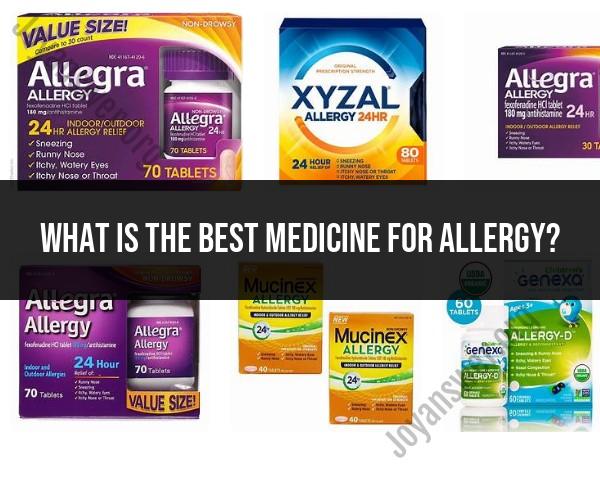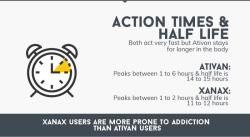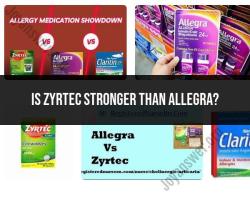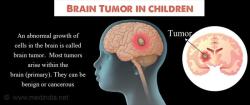What is the best medicine for allergy?
The best medicine for allergy relief depends on the type and severity of your allergies, as well as your individual response to different medications. Allergies can manifest in various ways, such as seasonal allergies (hay fever), food allergies, insect sting allergies, or allergies to pet dander and dust mites. Here are some common types of allergy medications and their uses:
Antihistamines:Antihistamines are often the first line of defense for allergy relief. They work by blocking the effects of histamine, a chemical released by your immune system in response to allergens. Common over-the-counter antihistamines include:
- Cetirizine (Zyrtec)
- Loratadine (Claritin)
- Fexofenadine (Allegra)
- Diphenhydramine (Benadryl)
Decongestants:Decongestants help relieve nasal congestion by narrowing blood vessels in the nasal passages. They are often used in combination with antihistamines in allergy medications. Common decongestants include:
- Pseudoephedrine (Sudafed)
- Phenylephrine
Corticosteroids (Nasal Sprays):Nasal corticosteroids are effective for treating allergic rhinitis and other nasal allergies. They reduce inflammation in the nasal passages and provide relief from congestion and sneezing. Common nasal corticosteroids include:
- Fluticasone (Flonase)
- Mometasone (Nasonex)
- Budesonide (Rhinocort)
Oral Corticosteroids:In severe cases of allergies, such as allergic reactions to insect stings, oral corticosteroids like prednisone may be prescribed to reduce inflammation.
Leukotriene Modifiers:Leukotriene modifiers, like montelukast (Singulair), are used to manage allergic asthma and may be prescribed for people with asthma triggered by allergies.
Immunotherapy (Allergy Shots):Allergy shots, also known as immunotherapy, involve receiving regular injections of allergen extracts to desensitize the immune system over time. This treatment can be effective for severe allergies but is typically administered under the guidance of an allergist.
Mast Cell Stabilizers:Mast cell stabilizers like cromolyn sodium can help prevent the release of histamine and other chemicals that cause allergy symptoms. They are often used for eye allergies.
Epinephrine (EpiPen):Epinephrine auto-injectors are prescribed for individuals with severe, life-threatening allergies, such as those to insect stings or certain foods. It is used to treat anaphylactic reactions.
Anticholinergic Nasal Sprays:These sprays can help reduce nasal symptoms by blocking the effects of acetylcholine, another chemical involved in allergic reactions. Ipratropium bromide (Atrovent) is an example.
The "best" allergy medicine for you will depend on your specific symptoms, the triggers of your allergies, your medical history, and any potential side effects. It's essential to consult with a healthcare professional, such as an allergist or primary care physician, who can assess your allergies and recommend the most appropriate treatment for your situation. They can also advise on the best combination of medications if needed, as some allergies may require a multi-pronged approach to control symptoms effectively.
What Is the Best Medicine for Allergies?
The best medicine for allergies depends on the individual's symptoms and medical history. Some of the most common types of allergy medications include:
Antihistamines: These medications block histamine, a substance that your body releases when you come into contact with an allergen. Antihistamines can help relieve sneezing, itching, runny nose, and watery eyes.
Decongestants: These medications help to relieve nasal congestion. They can be taken orally or as a nasal spray.
Corticosteroids: These medications are available as nasal sprays, oral medications, or eye drops. They are more effective than antihistamines and decongestants at relieving allergy symptoms, but they can also have more side effects.
Over-the-Counter vs. Prescription Allergy Medications
Many allergy medications are available over-the-counter (OTC), without a prescription. However, some stronger medications are only available by prescription. If your OTC allergy medications are not working, you should see a doctor to discuss prescription options.
Antihistamines, Decongestants, and Corticosteroids: Which is Right for You?
The best type of allergy medication for you depends on your symptoms. If you have mild symptoms, such as sneezing and a runny nose, an antihistamine may be all you need. If you have more severe symptoms, such as nasal congestion or itchy eyes, you may need a combination of medications, such as an antihistamine and a decongestant. If your symptoms are not controlled with OTC medications, you may need a prescription corticosteroid.
Natural Remedies for Allergies: Do They Work?
There is some evidence that natural remedies, such as nasal irrigation and acupuncture, can help relieve allergy symptoms. However, more research is needed to confirm these findings.
Finding the Right Allergy Medication for Children
Children can take many of the same allergy medications as adults. However, it is important to talk to your child's doctor to make sure you are giving them the right medication and dosage.
Here are some additional tips for finding the right allergy medication:
Talk to your doctor: Your doctor can help you choose the best medication for your symptoms and medical history.
Start with a low dose: If you are taking a new allergy medication, start with a low dose and increase it gradually as needed.
Be aware of side effects: Some allergy medications can cause side effects, such as drowsiness or dry mouth. Be sure to read the medication label carefully and talk to your doctor if you experience any side effects.
Don't take more than one medication at a time: Unless your doctor tells you to, do not take more than one type of allergy medication at a time. This can increase your risk of side effects.













